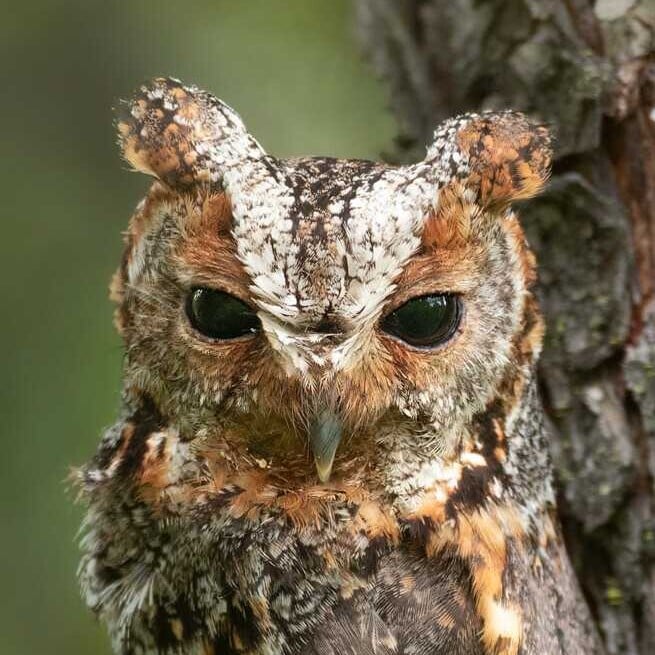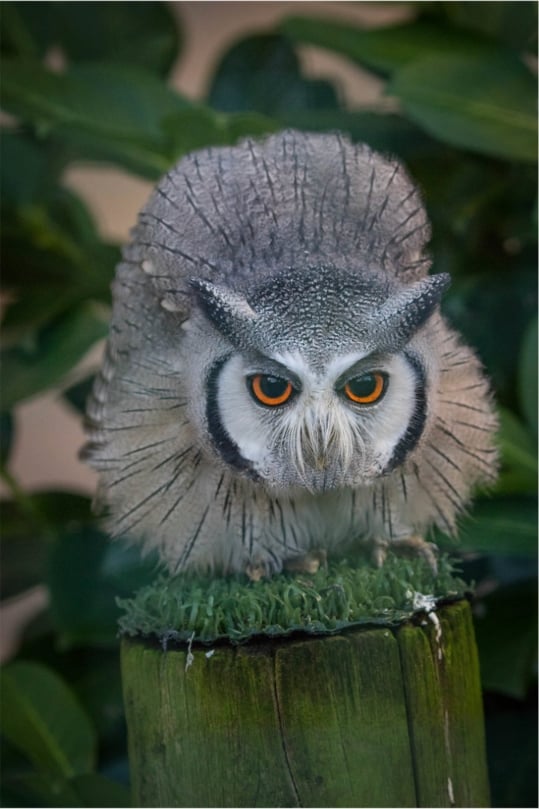Photo by Hayden Wood
Taken in the photographer’s shed.
The Morepork seems to be caught in the middle of battle between man and rat. NZ wants to poison the Pacific Rat (kiore), and there have been air drops of massive amounts of poison. The poison does kill huge amounts of the rats, but about 95% of owl pellets have the rats in them, so owls consume the poison rats and die.
On the other hand, NZ had no native terrestrial mammals, since New Zealand was already far off in the ocean before any mammals existed. Due to this, the owls never evolved a defense against rats, so the rats eat a number of baby owls or owl eggs.
The government argues this is still a net benefit for the native wildlife, but as these poisoning efforts seem to not work completely, letting the rat populations bounce back, it seems local animals are killed by the poison and the rats.
The Maori people also do not seem to want the rats killed off. They have cultural importance to them, and it seems they purposely brought them to New Zealand in their boats.
Conservation in New Zealand sounds like a difficult job!
If any locals can add some insight, that would be great. It seems there are many conflicting perspectives on this matter. I know in the US poisoning can be a big issue to our raptors. Even bald eagles succumb to the collected poison in their systems. New Zealand seems extra vulnerable though, due to animals not having a natural defense to these types of animals.
This got a little more intense than I intended, so I’ll add some more pics of cute owls in the comments!


That last article you linked is exactly where I saw a lot of that info. This really highlights some of the pitfalls of “doing your own research.”
Having access to info and having context aren’t the same thing. I don’t know the name of a single legit source of NZ news. The article looked well written and the website looked like a legit conservation website. With US news I have enough experience to know what to trust, such as NY Times vs New York Post, but not with outside news. And then as with “is the kiore important to Maori” I can find facts to support that, strengthening confirmation bias.
I’m also shocked to learn there are that many Maori. Our native people make up less than 3 percent of our population. I don’t think we ever talked about Maori in school. I remember for a while stealing their safety style for tattoos was common, and that was probably my first exposure to who they are.
I can definitely see the training behind the poison and how it can be beneficial, and that’s why I was hoping someone who lived there could fill me in better. You and the other commenter have given me much to look into. I appreciate you both correcting me in a nice way. I’m sure it’s difficult having to correct so many people online.
That last article is a legitimate website, I think perhaps you just misunderstood what it was saying. In fact so did I slightly, because re-reading it I see they were trying to eradicate kiore from one of the Hen and Chickens while protecting them on another two.
But the Hen and Chickens is just tiny, 5 square miles altogether with no human habitation, and unique ecology, conditions there are not representative of the mainland at all. So I guess that’s the context you were missing.
Kiore used to be a prized food. The fact that some Maori consider kiore a taonga (valuable treasure) is enough to get them protected on those two little islands, but to my knowledge no one has ever advocated just letting them eat all the native birds (which are also important to many Maori).
And don’t worry, it’s a common misconception in the Northern hemisphere that Maori are a tiny minority and/or live separately in “tribal villages” or something. In reality there are Maori in government, in the civil service, in the NGOs etc, all of whom have input in these kinds of decisions.
Thank you again for all of this. There is so much for me to learn about all this. I find it fascinating.